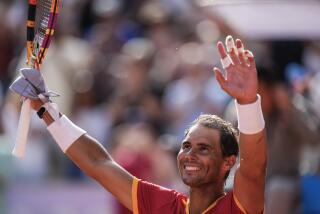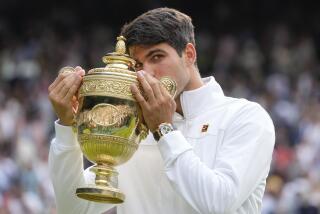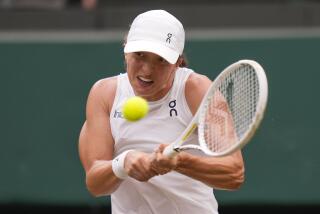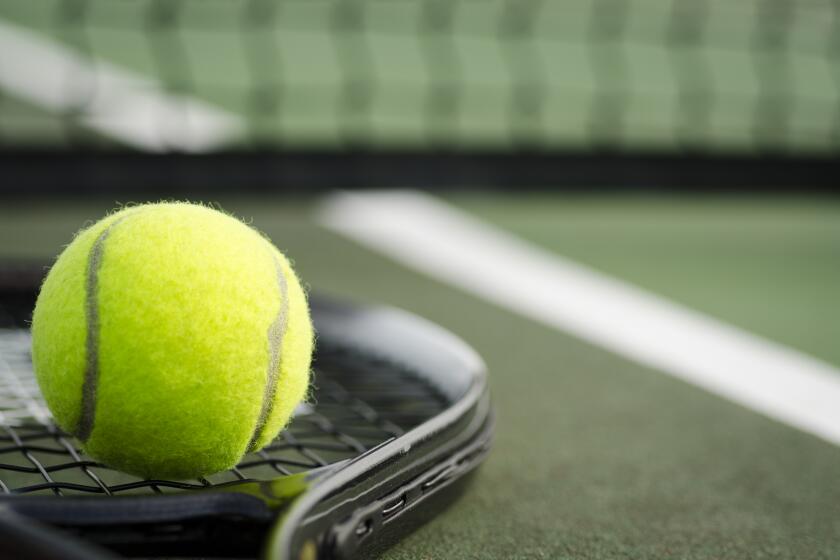Stunningly forceful fourth for Nadal
- Share via
PARIS -- A gathering of tennis spectators felt sorry for Roger Federer on Sunday, a downright weird sensation believed to be a global first.
Every so often they tried to urge him on as if he were some hopeless, helpless, hapless straggler who had leaked into the draw from the qualifying, as they watched his ingenious game shrink to unrecognizable rubble opposite a Spanish Godzilla.
To a five-year Federer era decorated with witnesses’ admiration, appreciation and awe, down the pike came a palpable alien visitor called pity, which found its way even to the conscience of one of sports’ great and budding dynasties, Rafael Nadal at Roland Garros.
As Nadal finished his inconceivable 6-1, 6-3, 6-0 victory over Federer in the French Open men’s final, the champion did not crumple joyously to the ground. He did not roll around in the clay as he had upon his three previous titles.
He merely raised his arms briefly, then jogged to the net for the handshake, perfectly aware of the warped disfigurement he had brought upon Federer’s game.
“Today it was tough for Roger, I think, and I have to be respectful with one very good guy,” Nadal said. “I have very good relationship with him, no? . . . . I mean, given the way things occurred and given the relationship I have to Roger, I just didn’t want to celebrate too much.”
So although Nadal’s numbers compel -- four consecutive titles, a 28-0 lifetime record at Roland Garros, an 83-7 record in sets, a 21-0 record in sets this year, the loss of only 41 games (lowest since Bjorn Borg’s 32 in 1978), the matching of Borg’s record four straight titles, the fact they ought to give Novak Djokovic some sort of trophy for even holding a set point and getting to a tiebreaker against Nadal -- even those faded Sunday against what his might did to a Swiss 26-year-old some consider the best player ever.
It was the unimaginable look of the thing.
While Nadal continued improving from mere domination of the French Open toward some sort of barely visited stratosphere, Federer took the worst Grand Slam loss ever for a No. 1 player. He took the worst in a Grand Slam final since John McEnroe beat Jimmy Connors, 6-1, 6-1, 6-2, in 1984 at Wimbledon, the worst in a final here since Guillermo Vilas beat Brian Gottfried, 6-0, 6-3, 6-0, in 1977. It was his worst loss in 173 Grand Slam matches and his first 6-0 loss in a set since the first of those 173, in the first round of the 1999 French Open against Patrick Rafter.
The way it looked caused frequent murmurs in the audience as Federer seemed far feebler than in any of the three previous years when Nadal beat him in four sets, including the 2006 and 2007 finals.
When Federer came to the net, he either muffed volleys or had passing shots roar by him. He didn’t resort much to drop shots, but when he did, he looked shockingly meek and lost.
Once all that failed, the reliable parts of his game splintered until they tabulated the unforced errors and found 35 for Federer, seven for Nadal. The time of the match -- 1 hour 48 minutes -- exceeded a straight-set (two sets) women’s final by only 10 minutes and Nadal’s 6-1, 6-1, 6-1 quarterfinal victory over 20th-ranked Nicolas Amalgro by only four minutes.
Given such lopsidedness, Federer couldn’t even feel much post-match irritation, even in failing to win the lone Grand Slam he hasn’t won.
“Right now I’d say it’s easier to lose this way as today,” he said, “because all along the match you realize that there is nothing you can do. You’re not going to win. . . . It’s always more difficult when you lose when you really could have won. Today I lost, and I lost clearly.”
He lost to a gale force who’s still only 22 and who has improved on French clay when improvement seemed superfluous. Nadal’s backhand frequently earned gasps Sunday, and his offense and defense looked even more airtight than in a 6-3, 4-6, 6-4, 6-3 win over Federer 12 months ago on the same court.
“He no longer plays short balls as he did in the past,” Federer said. “You can no longer attack him on the forehand, as I could in the past. He is getting much more aggressive, and it’s becoming much more difficult. . . . My serve was OK. But he made huge progress returning my serve.”
Said Nadal of the new layer of aggression: “I think I’m playing more inside the court, so not typical two meters behind court.”
With Nadal now seemingly closer to winning in Federer’s kingdom of Wimbledon than Federer to winning Nadal’s kingdom of Paris, it seemed reasonable to ask whether Nadal felt as if he was the best player in the world, but he said, “No, no, no. I feel like No. 2, because I am. I am No. 2, and closer to No. 3 than the No. 1.”
He also spoke some slightly improved French to the audience and apologized graciously for winning so emphatically. Meanwhile, across the trophy-presentation platform stood a guy with 12 Grand Slam titles looking blank and dazed after a rare turn as prey. He had another one of those runner-up plates with Nadal’s invincibility suggesting his collection might grow.
--
(BEGIN TEXT OF INFOBOX)
Final pairings
Matchup between common opponents in tournament finals since the Open era began (1968); wins in parentheses:
20 -- x-John McEnroe (11) vs. Ivan Lendl (8)
16 -- Pete Sampras (9) vs. Andre Agassi (7)
16 -- Boris Becker (11) vs. Stefan Edberg (5)
15 -- y-John McEnroe (7) vs. Jimmy Connors (7)
13 -- Rafael Nadal (9) vs. Roger Federer (4)
13 -- Boris Becker (7) vs. Ivan Lendl (6)
x -- one match unfinished because of rain;
y -- McEnroe won one match by walkover
Source: Associated Press
More to Read
Go beyond the scoreboard
Get the latest on L.A.'s teams in the daily Sports Report newsletter.
You may occasionally receive promotional content from the Los Angeles Times.










